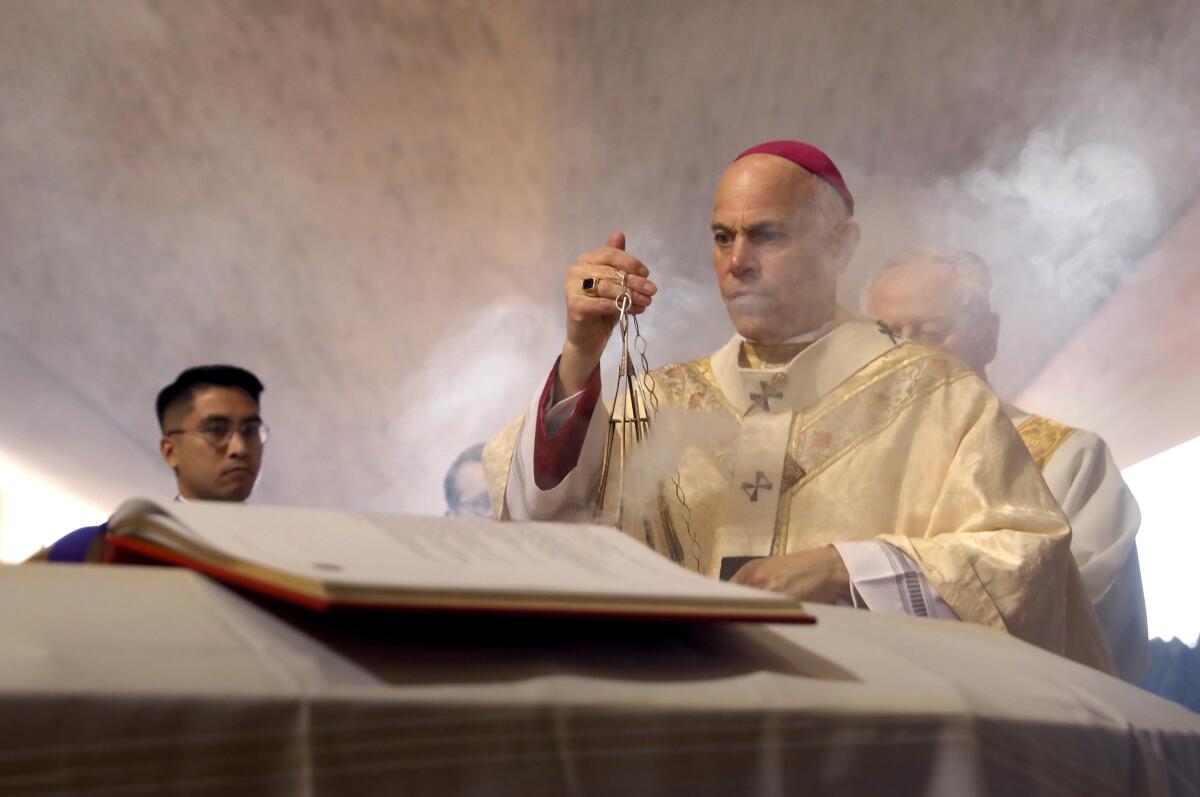San Francisco Archdiocese says bankruptcy ‘very likely’ given child sex abuse lawsuits

- Share via
The Archdiocese of San Francisco will “very likely” file for bankruptcy in order to deal with a wave of lawsuits alleging child sexual abuse by its priests and other employees and volunteers going back decades, the archbishop said.
In an open letter Friday, Archbishop Salvatore J. Cordileone said the option was the result of “much contemplation and prayer” and arose from discussions with lawyers and financial advisors.
More than 500 civil lawsuits alleging abuse were filed against the Catholic archdiocese between 2020 and 2022, when California temporarily lifted the statute of limitations on such allegations against churches and other institutions.
Cordileone said filing for Chapter 11 bankruptcy would allow the archdiocese “to deal with the hundreds of cases collectively rather than one at a time” and “reorganize its financial affairs to continue its vital ministries to the faithful and to the communities that rely on our services and charity.”
The archdiocese would not be the first in California to take such action. Bankruptcy has been filed or mulled by dioceses across the state, including in Oakland, Santa Rosa, Sacramento and San Diego.
The change to California’s law spurred thousands of lawsuits over alleged abuses dating as far back as the 1940s, against churches, religious groups, private and public schools, sports groups and nonprofit organizations.
In May, Los Angeles County officials predicted having to spend between $1.6 billion and $3 billion to resolve about 3,000 allegations of sexual abuse at its foster homes, children shelters, and probation camps and halls.
The filings against the Archdiocese of San Francisco have far outpaced those filed against it when the state previously lifted the statute of limitations on abuses, in 2003. During that window, the archdiocese was forced to pay about $68 million to settle claims from about 100 accusers, it said.
Chapter 11 bankruptcy is geared toward reorganization rather than folding, and Cordileone said if the archdiocese does file for it, its parishes and schools “should continue as usual without disruption.”
The process would essentially freeze individual lawsuits against the archdiocese during the bankruptcy proceedings, and allow for the archdiocese to seek a single settlement that would resolve all of the claims at once.
Cordileone made the option sound beneficial to those who have accused the church of wrongdoing. He wrote that the process would help to “resolve difficult claims fairly and equitably,” and “could result in a faster resolution for hundreds of survivors.”
Victim advocates of accusers strongly rejected his framing of the situation.
The survivors’ network SNAP said dioceses filing for bankruptcy in the face of abuse claims was part of a “ruse” to “pretend that they are out of money.”
“Everything about the bankruptcies of Catholic dioceses strikes us as wrong,” the group said in a statement. “It is all about protecting secrets first, and second, to reduce just compensation to the victims they have created.”
The archdiocese claimed in a Q&A posted with Cordileone’s letter online that filing for bankruptcy was not about minimizing expenses but making the process more fair for all of its accusers — as the cost of litigating the more than 500 cases separately “would certainly exceed our resources.”
Without bankruptcy protections, it said, victims who filed their lawsuits first “could have an unfair advantage over claimants who have their cases heard later.”
Cordileone also sought to paint the mountain of claims against the church as the result of past troubles the archdiocese has since moved beyond. He wrote that, of the more than 500 lawsuits filed in recent years, “the vast majority of the alleged abuse occurred in the 1960s, 1970s, and 1980s and involved priests who are deceased or no longer in ministry.”
He said that by “utilizing a stringent screening process and enhancing awareness and education for children and adults, the occurrences of abuse within the Church are very rare.”
Victim advocates rejected that notion, too. They said abuse in the church is an ongoing problem, and abusers are still being protected by the church. They also blasted Cordileone individually for long refusing to open the archdiocese’s internal files and release the names of accused priests, employees and volunteers in the San Francisco archdiocese, as leaders of other dioceses have done.
“We seriously doubt that the Archdiocese of San Francisco does not have the assets to settle these lawsuits,” SNAP wrote. “But we do know that San Francisco is one of a handful of dioceses that has not published a list of abusers, and also that when such lists are published, there are always new perpetrators revealed from information in the ‘secret files.’ ”
The archdiocese said that more than two dozen U.S. dioceses have filed for bankruptcy in the country to date, and many “have been able to successfully emerge and continue their ministries and support their communities.”
Cordileone did not give a time frame for when a final decision on filing for bankruptcy would be made. He said the “situation remains very fluid.”
More to Read
Sign up for Essential California
The most important California stories and recommendations in your inbox every morning.
You may occasionally receive promotional content from the Los Angeles Times.










